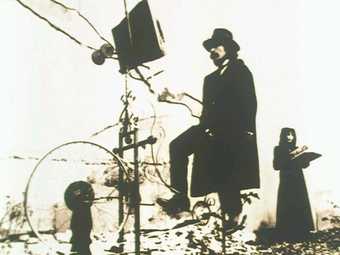‘I was bought up in a film theatre owned by a relative of my mother. I lived in a small room behind the screen. Every day, every night, the film soundtracks distracted me and kept me awake. And so in my childhood I learned to love and hate cinema.’
Shūji Terayama, 1971
A Young Persons Guide to Cinema is Terayama’s multiple projection of ‘orgies and memories’ that shares its introductory motif with his 1979 essay-manual, A Young Persons Guide to Suicide. It was originally made for the 100ft Film Festival hosted by Tokyo’s Image Forum and made use of three projectors to screen 300ft at the same time, each roll tinted with one of the three primary colours of light. The film will be presented in its original 3-screen format for this event. The Reading Machine promises to extend the physical body but this intricately designed instrument of labour ends up subordinating and tormenting its subject. Terayama was always suspicious about the apparatus of cinema and in these films he forms a playful pedagogical relationship with the viewer who is characteristically left with unanswered questions. The Cage is the earliest film in this season and features a prisoner of time in a time-based medium. Terayama never feels the need to explain the seemingly accidental forces that drive the two body builders to flex their muscles or the fat woman to wander across a field like a clockwork toy and it’s a sentiment that continues in The Labyrinth Tale where two men transport an entire doorway complete with its door. The Two Headed Woman: A Shadow Film is the closing film in this programme. Mediation on the apparatus of cinema leads to an investigation of life behind the screen. Images of both childhood innocence and sexual passion are fashioned through pared down theatricality while shadows are added to the film from the projection booth.
A Young Persons Guide to Cinema (Seishōnen no Tame no Eiga Nyūmon)
Shūji Terayama, 1974 Japan, 16mm (3-screen), 3 min
The Reading Machine (Shokenki)
Shūji Terayama, 1977 Japan, 16mm, 22 min
The Cage (Kanshū)
Shūji Terayama, 1962 Japan, 16mm, 11 min
The Labyrinth Tale
Shūji Terayama, 1975 Japan, 16mm, 15 min
The Two-Headed Woman: A Shadow Film (Nitōjo: Kage no eiga)
Shūji Terayama, 1977 Japan, 16mm, 16 min
Curated by Thomas Dylan Eaton in association with Tate Modern.
With generous support from Daiwa Anglo-Japanese Foundation, Japan Foundation, Sasakawa Foundation, Toshiba Foundation, and All Nippon Airways.
Tate Film is supported by Maja Hoffmann / LUMA Foundation.

